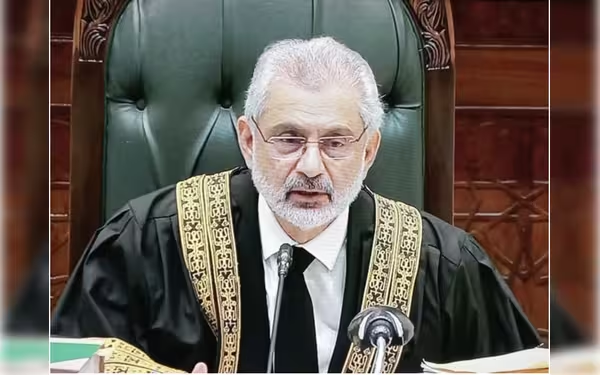Saturday, November 16, 2024 05:59 PM
CJP Qazi Faez Isa Questions Relevance of Forms-45 in Pakistan Elections
- CJP emphasizes need for evidence in electoral claims.
- Forms-45 critical for linking votes to results.
- Judiciary's role vital in upholding electoral integrity.
 Image Credits: tribune.com.pk
Image Credits: tribune.com.pkCJP Qazi Faez Isa questions the relevance of Forms-45 in Pakistan's electoral process, emphasizing the need for evidence and integrity.
In a significant development regarding the integrity of electoral processes in Pakistan, Chief Justice of Pakistan Qazi Faez Isa addressed concerns over the validity of election results during a court hearing on Thursday. The case brought to light allegations of manipulation in the electoral process, raising questions about the reliability of the Forms-45, which are used to record votes at polling stations.
During the proceedings, Chief Justice Isa posed critical questions to the petitioner's lawyer, seeking clarity on the basis of the claims made. He emphasized that judicial decisions must be grounded in factual evidence and official records rather than mere accusations. This stance underscores the importance of a fair and transparent electoral process, which is vital for the functioning of democracy in Pakistan.
One of the key points raised by the Chief Justice was the need for the petitioner to substantiate claims of bias among presiding officers. He challenged the lawyer to provide evidence of any familial connections that could indicate a conflict of interest. This insistence on proof highlights the judiciary's role in ensuring that allegations are not taken lightly and that the integrity of the electoral process is upheld.
The discussion around Forms-45 is particularly relevant as these documents serve as a crucial link between the votes cast and the final election results. If these forms are deemed irrelevant or manipulated, it could lead to significant implications for the trust citizens place in their electoral system. The Chief Justice's remarks serve as a reminder that the judiciary is vigilant in its duty to protect democratic values.
As the case unfolds, it is essential for all stakeholders, including political parties and the public, to remain engaged and informed. The integrity of elections is not just a legal matter; it is a cornerstone of democracy that affects every citizen. Ensuring that elections are free from manipulation is crucial for fostering trust in governance and encouraging civic participation. The outcome of this case could set important precedents for future elections in Pakistan, making it a pivotal moment in the country’s democratic journey.













